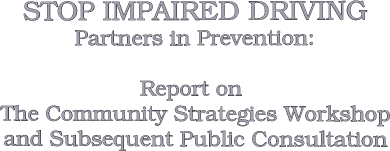
|
Executive Summary
Background
On December 12, 2000, the Government of Manitoba held a one-day workshop ("the
Workshop") on impaired driving issues for key stakeholders in the impaired driving
and transportation fields. That was followed by a public consultation, which was conducted
by way of a questionnaire. The viewpoints expressed in this report are strictly those of
the Workshop and the public consultation participants. This report is not a government
position paper and should not be construed as representing the views of the Government of
Manitoba.
Summary of Key Comments
1) Education And Prevention
- Consider making driver education a credit course, with information on all types of
impairment, off-road vehicle impaired driving and victim and offender consequences.
- Consider beginning impaired driving education at an earlier age and involve parents.
- Consider using a co-ordinated multi-agency approach for impaired driving advertising,
having advertising year round and targeting a variety of groups and audiences.
- Consider having "Operation Rednose" operate all year and incentives like
reduced insurance or licence costs and free shuttles to promote alternate transportation
use.
- Designated driver programs must be supported by businesses, could offer incentives to
participants (e.g. gift certificates) and could provide education beginning at age 14.
- Consider mandatory alcohol server education for alcohol servers, management and owners
of businesses that sell alcohol.
- There could be more education on party hosting responsibilities and designated drivers
could be a required condition on liquor permits.
2) Impaired Driving Sanctions and Countermeasures
- The majority of participants were in favour of vehicle forfeiture for repeat impaired
driving offences (e.g. 3 in 5 years) and impaired offences involving death or injury.
- The majority of participants supported the implementation of an ignition interlock
program in Manitoba.
- Participants were concerned about increasing driver's licence suspension lengths for
impaired driving offences without increasing enforcement of those laws.
- Participants were undecided about whether lifetime driver's licence suspensions should
be implemented in Manitoba.
- Participants were undecided about whether increasing impaired driving sanctions might
result in increased suspended driving and police chases.
- Participants thought that there might be merit in allowing licence suspension reductions
for participation in rehabilitation, but not in return for community service.
3) Law Enforcement
- The majority of participants did not support the use of Passive Alcohol Sensors.
- The majority of participants supported Standard Field Sobriety Testing and Drug
Recognition Evaluation programs for police.
- Detection of Off-Road Vehicle impaired drivers and suspended drivers could improve with
better database systems, a dedicated suspended driver unit, more patrols on trails, and
more and better mobile breath test programs.
- Delays in processing impaired drivers might be reduced by using better equipment,
streamlining forms, using more staff, and either making roadside alcohol screening device
results admissible in court or allowing police to proceed with breathalyzer tests without
the need to use roadside alcohol screening devices.
4) Alcohol and Other Drug Intervention Programs
- The concept of "treatment" should include all types of interventions for
impaired drivers and just not be limited to rehabilitation of chemically dependent
persons.
- The majority of participants thought that forced mandatory participation in treatment
was a bad idea, would not be effective and could be disruptive to programs.
- The majority of participants was opposed to mandatory treatment and did not think that
it was appropriate for the Addictions Foundation of Manitoba program.
- The majority of participants thought that, if mandatory treatment was implemented, it
should be operated on a user-pay basis.
- New ideas for rehabilitation interventions included specialized drug courts, a
rehabilitation strategy involving ignition interlocks and a restricted licence, ending the
right of hardcore repeat offenders to drive and making offenders participate in victim
impact panels or counselling sessions with the victim or the victim's family.
Top of page |


![]()